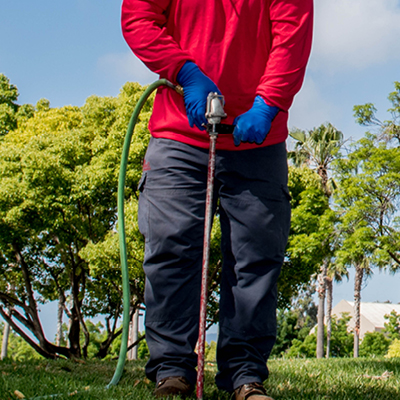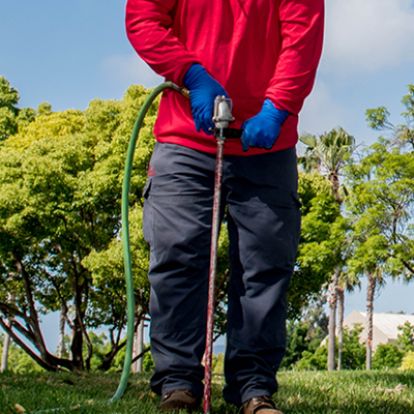What Does Soil Drainage Have to Do with Plant Health Care?

Many plants suffer or die in soil that is too wet or too dry. Knowing what type of soil you have and how it affects the greenery on your commercial property can dramatically impact your chances of successfully growing healthy, beautiful foliage. Your soil varies depending on your region and even how your property is situated. For example, hillside properties almost always drain well, while bottomland can be extremely poor in drainage. There is also diversity in soil structure that influences soil drainage and plant health care needs.
How Your Soil Type Affects Your Plants and Trees
What do soil type and drainage have to do with plant health care? As with the value of commercial real estate, the key to plant health is often “location, location, location.” Soil drainage affects the availability of water and plant nutrients. Many commercial landscaping sites lack the ideal drainage conditions. Because each plant species has different nutrient and irrigation needs, understanding the soil type on your property can help you manage issues integral to plant health.
Common Soil Types
Do you know which of these common soil types you have on your Seattle or Bay Area commercial property?
- Sand
Sand particles are quite large, draining quickly. Because sand does not retain moisture or nutrients well, plants grown in this type of soil require more frequent watering and intensive plant nutrient management to ensure health.
- Clay
Clay particles are extremely fine, sticking tightly together when moist. Clay is packed with nutrients and holds water well, but drains poorly, making your plants prone to fungal issues. If water displaces air, your plant’s roots, which thrive on oxygen, can suffocate, and they may die. Because of its dense composition, it can be difficult for the roots of young plants to penetrate clay.
- Silty soil
Typically found along riverbeds and lakes, silt particles are between sand and clay particles in size. Silty soil is one of the most fertile soil types, because it retains nutrients and moisture well but drains more quickly than clay. - Loam
Loam is a mixture of sand, silt, and clay. Providing the benefits of all three types of soil, it is the ideal growing medium. Some loams possess a higher proportion of sand or clay by volume.
What Type of Soil Do You Have on Your Commercial Property?
Arborwell plant and tree health care services experts have identified these types of soil in our commercial landscape management service areas:
- The Bay Area is fortunate to have soil made of clay with loam, including rocky clay loam in the hills and gravelly loam in the valley.
- Seattle Area soil is primarily Tokul soil, which is quite rare. Tokul soil began as volcanic ash. It is one of the most productive soils in the world. Tokul features a surface layer of gravelly loam, rich with plant matter, a reddish middle layer infused with iron oxides, and a cemented, root limiting layer of glacial till 20-40 inches below the soil surface. Though its top layers drain well, the cemented glacial till layer has high water and precipitation storage capabilities.
Finding the Right Balance
At Arborwell, we can help you analyze your soil on your commercial property, identifying issues, and taking corrective action when necessary. Depending on the unique composition of your soil, we may need to employ solutions such as soil amendments, to correct drainage and nutrient issues impacting plant health. Because each plant species has different requirements, this can complicate the plant health care landscape. Fortunately, Arborwell experts are well-versed on the soil types in your region, expertly assessing the irrigation and nutrient needs of your plants to help you achieve the right balance.
Are drainage issues destroying the landscaping on your Seattle or Bay Area commercial property? Schedule a plant health care consultation with an arborist in your area. Contact Arborwell Professional Tree Management at today.
